The Learning Styles of Every Myers-Briggs® Personality Type
Today we’re going to dive into the learning styles of each MBTI® type. One of the questions I get asked the most by teachers and parents is whether there is any connection between personality type and learning style. We’re all wired to process information differently. Intuitives want to talk about meanings, concepts, and theories, while sensors prefer concrete, factual information. Extroverted children learn better in groups whereas introverted children generally learn better independently. That said, there are so many nuances and variables between each type and how they prefer to learn and that’s what this post is about!
To learn more about type and learning style, you can check out Introduction to Type and Learning, The MBTI® Manual or Building Blocks of Personality Type.
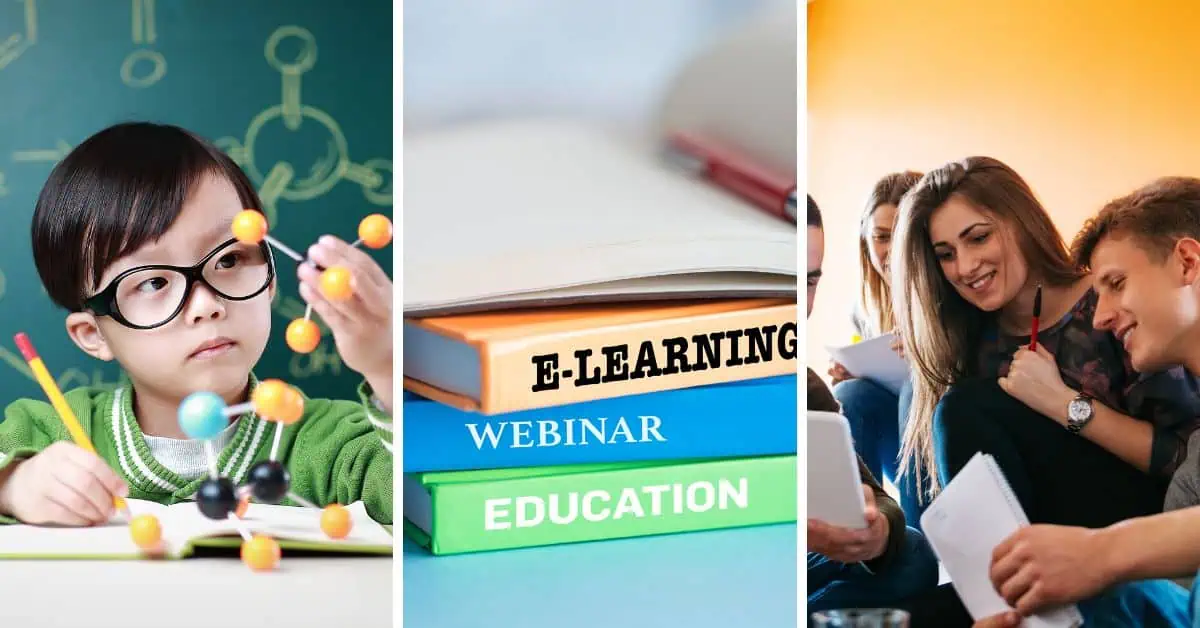
The Learning Styles of Every Myers-Briggs® Personality Type
Not sure what your personality type is? Take our new personality questionnaire here. Or you can take the official MBTI® here.
Table of contents
- The Learning Styles of Every Myers-Briggs® Personality Type
- The ISTJ Learning Style
- The ISFJ Learning Style
- The ESTJ Learning Style
- The ESFJ Learning Style
- The ISTP Learning Style
- The ISFP Learning Style
- The ESTP Learning Style
- The ESFP Learning Style
- The INTJ Learning Style
- The INFJ Learning Style
- The ENTJ Learning Style
- The ENFJ Learning Style
- The INTP Learning Style
- The INFP Learning Style
- The ENTP Learning Style
- The ENFP Learning Style
Estimated reading time: 28 minutes
The ISTJ Learning Style
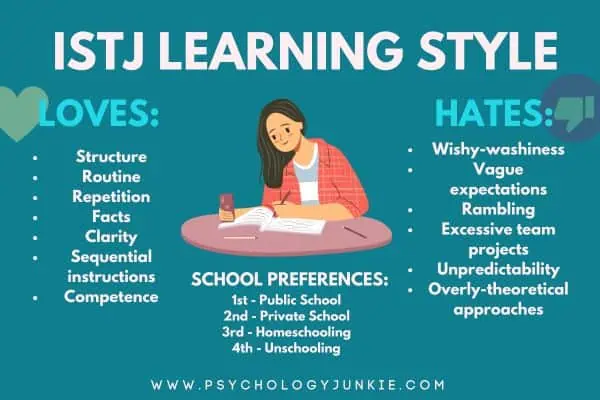
ISTJs tend to learn best through experience, hands-on practice, and repetition. They like a highly structured learning environment and can absorb information better when they have a steady, consistent routine. Retaining facts is easy for them, and they usually excel in reading apprehension, math, science, and any kind of technical field. In school, they focus on competence, achievement, and consistency. They want clear objectives and expectations, and will bristle against teachers who are wishy-washy, skip over details, or who have too many vague expectations. Instead, they want instructions to be given in a sequential, step-by-step order if at all possible.
ISTJs need plenty of time to think over tasks and projects independently before joining in a group. They are usually independent, observant learners, although they can do well in small group settings. Large groups tend to make them apprehensive, but they do enjoy the freedom to ask their teachers questions. Theoretical or conceptual subjects should be given as homework for ISTJs, that way they have the time to study the concepts more in-depth and at their own pace.
The MBTI® Manual states that ISTJs are adaptively creative learners. This means that they like to apply existing solutions and techniques to new scenarios and changed situations. They try to do things better each time and focus on perfecting their technique. Adaptive creative types like to create original ideas that are more likely to fit existing models. They are usually systematic, disciplined, and focused on refining techniques and solving problems.
School Preferences:
In a survey I conducted about type and education preferences, ISTJs chose public school as their preferred environment for learning. Private school followed close behind with homeschooling in last place. Unschooling had no votes at all.
Related: The Childhood Struggles of ISTJs
The ISFJ Learning Style
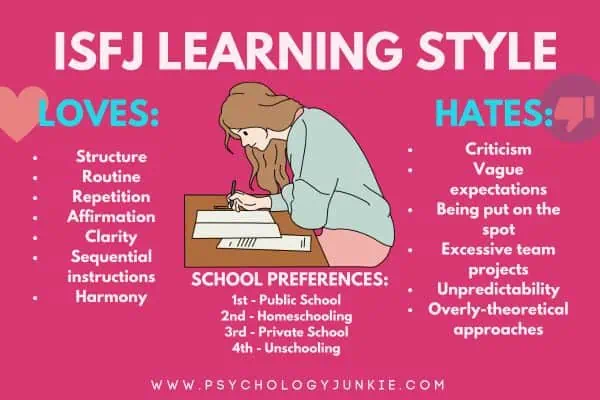
ISFJs learn through experience, hands-on practice, repetition, and memorization. They thrive in a highly-structured learning environment where the expectations are clear and the routine is consistent. They like sequential, step-by-step instructions and they need to know that their teachers respect and appreciate them. Regular affirmation by teachers and parents helps them to feel confident in their abilities. They retain details and facts very well and usually excel in reading apprehension, language arts, social studies, and anything with a practical application. Having a clear, linear explanation for things is key. They feel frustrated with teachers who bounce around a lot when they teach, or who skip over details.
ISFJs like plenty of time to observe and think over the tasks and details of their lessons before interacting with a group. Even a few minutes after lectures will allow them some time to reflect and organize their thoughts before they are expected to join into a group activity or brainstorming session. They work best independently or in small groups, but can feel more hesitant in larger groups.
According to the MBTI® Manual, ISFJs get better grades than the average student in high school, and they are rated by psychologists as one of two types least likely to have trouble in school. They are also the second most frequent type among education majors.
School Preferences:
In a survey I conducted about type and education preferences, ISFJs chose public school as their preferred environment for learning, but homeschooling followed close behind, with only two fewer votes. Private school had very few votes, and unschooling had no votes at all.
Related: Understanding ISFJ Feeling
The ESTJ Learning Style
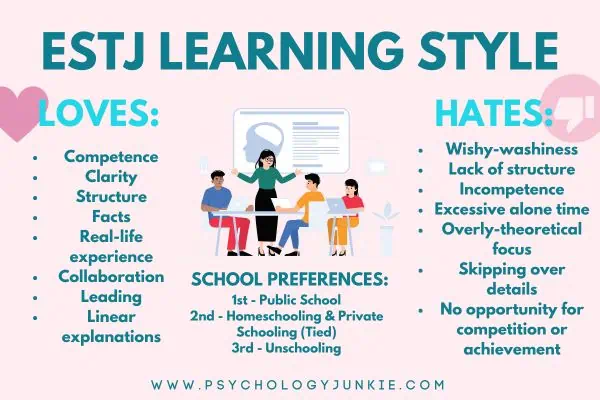
ESTJs learn best by experiencing, practicing, and memorizing. They are happiest in a challenging, highly-structured environment with a consistent routine and clear expectations. As sensors, they like instructions to be given in a clear, sequential order and they like visual demonstrations as much as possible. Gifted with a strong retention for facts, it’s not hard for them to remember the specifics and major points of any form of instruction. They prefer linear teaching as opposed to roundabout, abstract teaching. As far as subjects go, they tend to excel in math, history, and any form of practical or applied study.
ESTJs typically perform well in group discussion and learning situations. They like to think out loud with their peers and discuss facts and ideas in order to understand the concepts better. When paired with Perceiving students, they may struggle to get along. The Perceiver’s more flexible, informal approach can frustrate the ESTJ who likes everything done quickly, ahead of time, and all at once. As extroverts, ESTJs enjoy doing hands-on projects and working with their peers. They are usually happy to take a leadership position and organize group discussion and activities.
According to the MBTI® Manual, ESTJs have a high academic self esteem and are left hemisphere learners. They are the most frequent of the types among industrial and technical teachers as well as among vocational teachers. They are also among the four types with the highest overall undergraduate grades.
School Preferences:
In a survey I conducted about type and education preferences, ESTJs chose public school as their preferred environment for learning. Homeschooling and private school tied for second place. Unschooling received no votes at all.
Related: The Top 7 Gift Ideas for ESTJs
The ESFJ Learning Style
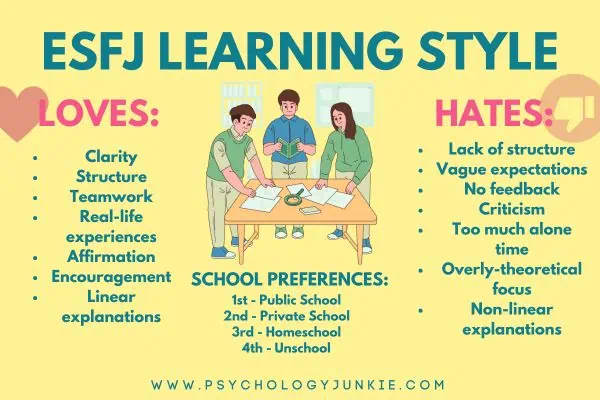
ESFJs tend to learn best through collaboration, hands-on experience, memorization, and real-life application. They are happiest in a highly-structured environment where harmony and collaboration are encouraged and fostered. Hard-working and responsible, they like doing what they can to please their teachers, parents, and get a good grade. They are careful note-takers, but they are also observant “shepherds” who look around to make sure everyone in the class feels accepted and included. ESFJs tend to enjoy being facilitators in the classroom; they like helping out their teachers and coming alongside students who are struggling and giving encouragement. A sense of order and a clear plan is crucial for ESFJs. Wishy-washy teachers, vague expectations, and unexpected disruptions tend to stress them out.
As Feeling types, ESFJs need to feel accepted and at home in the classroom. Criticism is wildly uncomfortable for them, even if it’s directed at someone else. They will lose respect for teachers who are highly critical or who are more focused on competition than cooperation. The harmonious atmosphere of the classroom is just as important to an ESFJ as the clarity of the content being taught.
ESFJs enjoy group activities and often make great leaders, ensuring that each person is heard and involved. They love team projects, building rapport, and organizing a schedule. According to the MBTI® Manual, ESFJs are the most frequent type among education majors and the highest in college retention.
School Preferences:
In a survey I conducted about type and education preferences, ESFJs chose public school as their preferred environment for learning. Private school came in second place, and homeschooling came in last place. Unschooling received no votes at all.
Related: Are ENFJs and ESFJs “Fake”?
The ISTP Learning Style
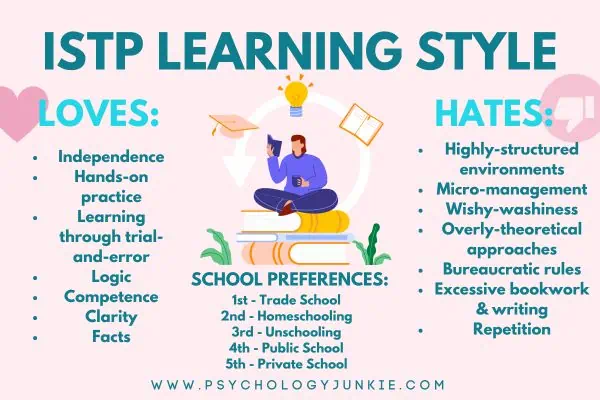
ISTPs learn best through hands-on, kinesthetic interaction and straightforward, logical teaching. They are extremely independent learners and enjoy a steep, challenging learning curve. Freedom and autonomy are key, and they like to have some space to study and learn at their own pace and in their own way. Highly-structured learning environments feel stifling to them and teachers who give long lectures are frustrating for them. Instead, they like their lessons short, sweet, direct, clear, and filled with real-life examples. They usually excel in math and practical skills.
ISTPs aren’t particularly fond of group study as a general rule. Competitions and games can be fun for them, but otherwise they prefer to work on their own with their own parameters. They do a lot of their analysis inwardly and are less likely to “think out loud” when solving a problem. For this reason, teachers can think that they are distracted or unfocused when really they are just privately analyzing the information that’s been given.
ISTPs like to learn best in a hands-on, kinesthetic way. Manuals and textbooks are less effective than learning through trial-and-error and experimentation. Unfortunately, ISTPs are rated by psychologists as the type most likely to have trouble in school. This is likely due to the fact that SPs are one of the most under-served temperaments in education. During elementary and high school many of the classes are taught by Sensing-Judging teachers, and thus, are often geared towards SJ (Sensing Judging) children. In college classes are often taught and geared towards intuitives. ISTPs who eschew structure and tradition and favor independent analysis and hands-on experimentation are rarely given the appropriate environment for their unique learning style.
School Preferences:
In a survey I conducted about type and education preferences, ISTPs chose trade school as their favored learning environment. This was followed closely by homeschooling and then unschooling. Public school and private school ranked lowest in their choices of preferred education.
Related: The Top 7 Gift Ideas for ISTPs
The ISFP Learning Style
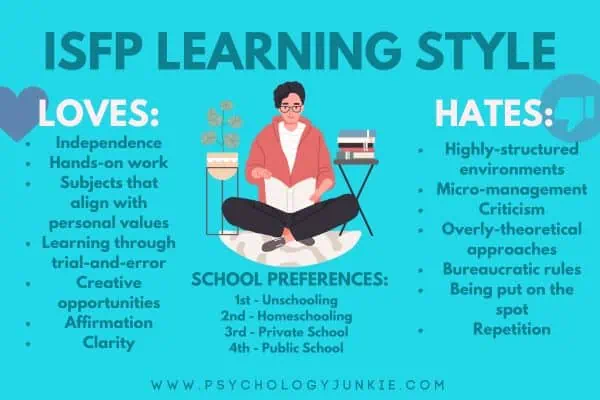
ISFPs learn best through exploration, experimentation, and hands-on learning. Having a harmonious learning environment with a supportive teacher is extremely important to them. They evaluate data according to their values, but they also trust facts and personal experience. Getting their hands on things, exploring in the real world, and seeing the cause-and-effect of their studies is key. They can usually absorb information better in a colorful, beautiful environment with a friendly, accommodating atmosphere. Atmosphere matters to an ISFP.
ISFPs are independent and private learners. Highly structured environments can feel stifling and overwhelming to them, and they prefer a more open-ended, creative approach. They enjoy having one-on-one coaching by a teacher they respect, and they sometimes enjoy group activities, but they hate being put on the spot or forced into competitions.
Making learning fun and hands-on is extremely important for teachers of ISFPs. They like teaching to be direct and to-the-point and they learn well through visual demonstrations with bullet points, videos, diagrams and charts.
School Preferences:
In a survey I conducted about type and education preferences, ISFPs chose unschooling as their preferred learning environment. This was followed by homeschooling, private school, and then public school came in last place.
Related: 10 Things You’ll Relate to If You’re an ISFP
The ESTP Learning Style
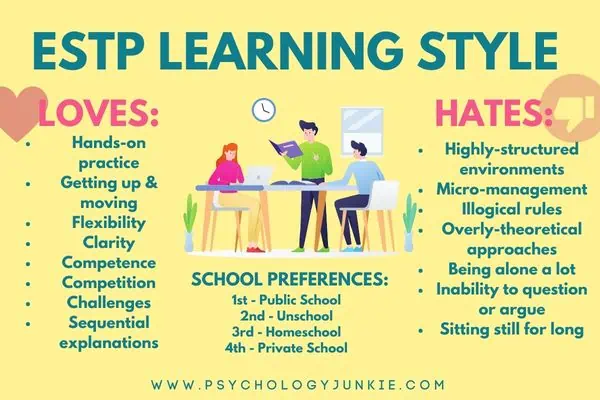
ESTPs learn best through kinesthetic, hands-on experience and clear, logical instruction. They prefer to be in an open-ended environment where they can get their hands-on things and experiment with a group. Regular breaks, time for movement, and collaborative activities keep them excited and energized. This helps them to maintain focus while sitting still for too long can make them distracted and frustrated. ESTPs are inspired by real-life learning and learning environments where they can touch, smell, manipulate, and see objects up close. They enjoy collaborative learning with regular breaks to get up and move around.
ESTPs like instruction to be clear, direct, and logical. They like to see real-life cause and effect of actions and they will be less interested in theory. Rambling lectures, highly structured environments, and a lot of bureaucratic rules are anathema to them. According to the MBTI® Manual, they rank higher on deductive reasoning than dominant thinking or feeling types (ETJs, ITPs, EFJs, IFPs). The manual also states that they prefer the academic subjects of history, math, and practical skills.
To make learning interesting and stimulating for ESTPs, it’s best to give them opportunities to solve problems quickly. Competition keeps things fun and helps them to retain information and put their all into what they’re learning. They are motivated by contests, challenges, and rewards. If you’ve got information to share with an ESTP one-on-one, be frank, direct, and ready for an argument if the information or direction doesn’t seem logical.
School Preferences:
In a survey I conducted about type and education preferences, ESTPs chose public schooling as their preferred learning environment, with unschooling coming in a very close second place. Homeschooling came in third place and private schooling came in last place.
Related: 5 Ways to Annoy an ESTP
The ESFP Learning Style
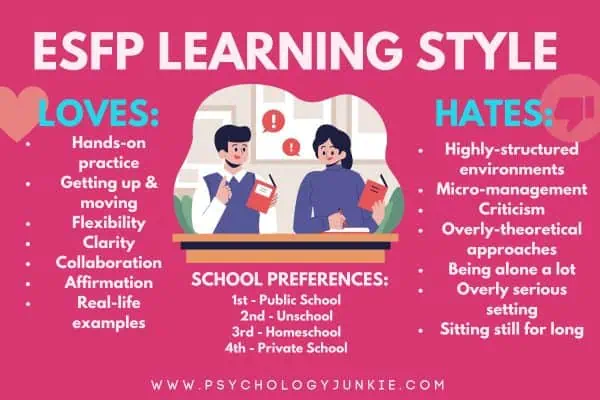
ESFPs enjoy a hands-on, interactive, friendly learning environment. Like ESTPs, they need regular breaks to move around and stretch their legs. They are happiest in a classroom where they are able to collaborate with other students, do plenty of group exercises and projects, and use manipulatives and hands-on techniques as much as possible. Highly structured learning environments tend to bore them and numb their excitement. Montessori-style schools are much more appealing. Unfortunately very few classrooms espouse this style of learning at the moment.
ESFPs learn well in action, or “on the job.” An interesting thing about ESFPs is because they are so affected by their external environment, it’s important for them to be in a place they enjoy to study. They tend to perform better in a place that seems welcoming, harmonious, and aesthetically pleasing. Conversely, they perform worse in places that seem gloomy, boring, rigid, or critical. Academically they are among the highest persisters in college and they rate higher on deductive reasoning than dominant thinking or feeling types (ETJs, ITPs, EFJs, IFPs). According to the MBTI® manual they prefer creative subjects like art, drama, and dance. They also tend to perform well in social studies and practical skills.
ESFPs like to give and receive positive feedback, and this is an important aspect of their learning environment. As children especially they need teachers who show them support and encouragement. They can struggle in their younger years with taking criticism personally, but they thrive when they feel welcomed. As one of the most realistic types, ESFPs like to know the real-world application of what they’re learning and have less patience for theory.
School Preferences:
In a survey I conducted about type and education preferences, ESFPs chose public schooling as their preferred learning environment, with unschooling coming in a very close second place. Homeschooling came in third place and private schooling came in last place.
Related: 5 Ways to Annoy an ESFP
The INTJ Learning Style

INTJs benefit most when they can discover theories, concepts, and be intellectually challenged. They tend to enjoy a structured yet open-minded learning environment. Instead of being given step-by-step instructions, they prefer to be given an overview or overarching framework for what they will learn. Then they like to process and complete the tasks in their own way. They make excellent independent learners and also work well in one-to-one settings. Group discussions and team projects can be a little more frustrating for them, because they often feel they don’t get enough time to inwardly examine the information first.
Classrooms that bother INTJs tend to be ones where everything is presented in a very “black and white” format. INTJs like to integrate and explore many different perspectives and are likely to challenge rules or principles that are presented as absolutes. They will often challenge many of the things they learn and be extremely skeptical until they can be sure that whatever “facts” are being presented are actually true. Highly social class settings are also a frustration for them. If everything is turned into a group discussion or a team project, they don’t get enough independence and time alone to really harness their creative powers. They like to have a quiet space where they can analyze information and create a mental model before interacting with others and presenting what they know.
INTJs aren’t as adept at absorbing facts and details as sensing types are. Instead, they tend to learn better through putting together connections and relationships to remember things. Rote memorization and repetition bore them so they usually will try to remember what’s important by developing analogies or acronyms to memorize enough information to pass an exam.
INTJs like teachers who seem competent, open-minded, and logical. They can usually handle constructive criticism very well and they tend to do well in school. According to the MBTI® Manual, INTJs are among the top two types for undergraduate grades. They are also one of two types with the highest first-semester college grades. And if that weren’t enough, they have the highest grades among persisters in college. Of all the types, INTJs consistently have the highest IQ scores (MBTI® Manual, page 269).
School Preferences:
In a survey I conducted about type and education preferences, INTJs chose private schooling as their preferred learning environment, with homeschooling coming in second place, public school in third, and unschooling in last place.
Related: 10 Things You Should Never Say to an INTJ
The INFJ Learning Style
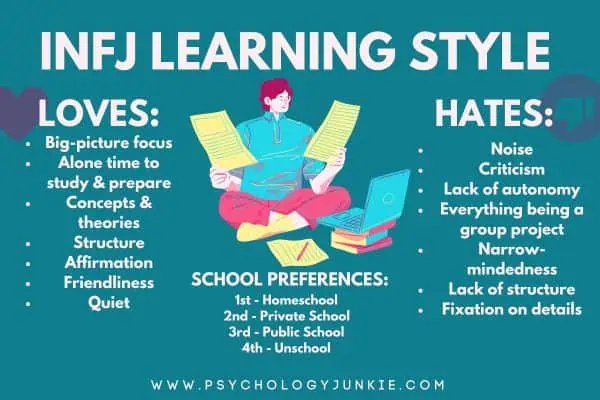
Like INTJs, INFJs also enjoy exploring concepts, theories, and deeper meanings. They enjoy having a structure, but don’t enjoy being told exactly how to do something or following the same routine day after day. They prefer being given an overall goal or an overarching framework and then filling in that framework with concepts and supporting facts and meanings. As Intuitive-Judgers, they enjoy planning for the future, envisioning a project, and doing things in a non-traditional way. They tend to excel when writing essays, where they have the freedom to privately process the information and add thoughts and perspectives in their own way. Their favorite academic subjects are usually art, English, and music.
INFJs try to put together analogies or acronyms to memorize information but will quickly get frustrated in an environment that focuses heavily on rote memorization and repetition. They also tend to bristle at “black and white” rules or teaching. As dominant Introverted Intuitives, they see everything from many different perspectives and shades of gray and tend to be skeptical of hard and fast rules and “absolutes.” While they may not outwardly express their disregard, inwardly they can find themselves turning over objections and exploring many different arguments and then presenting a model or project that contradicts what their teacher was saying.
INFJs excel as independent learners or with one-to-one coaching. They like to have plenty of private time to process information and create a mental image or model of what they are trying to understand or produce. Classrooms where group discussion is prevalent and there isn’t adequate time to think quietly before discussing can be stressful for them.
INFJs enjoy an encouraging, harmonious learning environment. They like criticism to be presented tactfully and they can also take it personally when teachers are critical with other students. Knowing how their studies are going to positively impact humanity in some ways is highly motivating.
According to the MBTI® Manual, INFJs are one of two types (along with INTJs) with the highest first-semester college grades. They are also among the top four types for undergraduate grades, and among the highest college persisters.
School Preferences:
In a survey I conducted about type and education preferences, INFJs chose homeschooling as their preferred environment for learning. Private school came in second place, public school came in third, and unschooling came in last place.
Want a comprehensive guide to the INFJ personality type? Check out my eBook, The INFJ – Understanding the Mystic.
Related: 10 Must-Read Books for INFJs
The ENTJ Learning Style
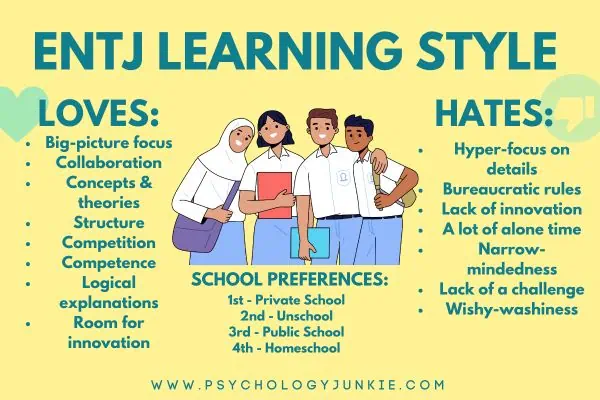
ENTJs learn best in a structured, organized, and competitive learning environment. They have a strategic focus when they learn and are always keeping their eye on long-term goals and system improvements. Like other Ni users, ENTJs like structure but they don’t like a rigid routine where they are told exactly what to do. They enjoy being given an overarching framework and a goal and then being able to fill in that framework or complete the goal in their own independent way. ENTJs are very skeptical of authority and have no problem calling out their teachers if they find flaws in their logic or if they can’t back up their arguments with credible sources and facts. They can get caught arguing semantics with their professors and teachers and they tend to feel energized by debate. In fact, they often excel in debate teams or in any setting that allows them to compete.
ENTJs are stimulated by complex and abstract ideas and they are driven to explore the logical frameworks behind these ideas. Decisive and ambitious, they enjoy team projects, competitions, and complex mental challenges. They have a strong focus on efficiency and can get frustrated with teachers who seem long-winded or rambling in their speech. In group projects they often take the lead, making sure that everyone is staying on task and keeping the overall vision in focus.
According to the MBTI® Manual, ENTJs are among the top four types for college grades, among the highest in college retention, and they have the highest grades among persisters in college. Their favored academic subjects are English and science.
School Preferences:
In a survey I conducted about type and education preferences, ENTJs chose private school as their preferred environment for learning. Unschooling came in second place, public school in third, and homeschooling in last place. At first I was surprised to see unschooling ranking so highly by ENTJs, as most extroverts and/or judging types preferred a more structured approach, but this is a testament to the independence of ENTJs and their ability to be self-directed learners.
Related: Are Certain Personality Types Smarter Than Others?
The ENFJ Learning Style
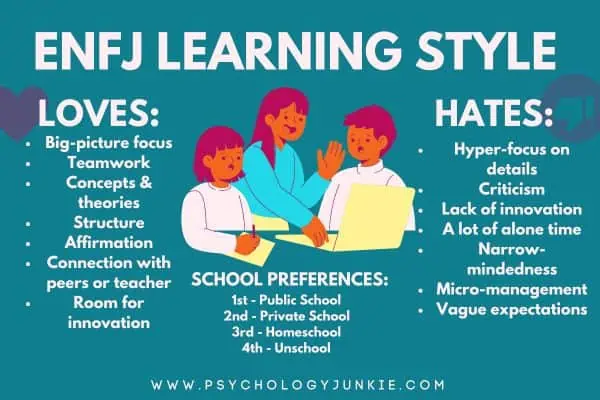
ENFJs are interested in concepts, theories, and deeper meanings. They’re always asking themselves “how will this information help or impact people?” They enjoy a collaborative, harmonious learning environment and are skilled facilitators and mentors to students who might be struggling in class or feeling left out. Having a structure is ideal for them, but they hate repetitive routines. Unlike ESFJs, ENFJs prefer to be given an overarching framework or “end goal” and then find their own unique ways to complete a project or fill in information. They tend to learn new concepts well and they like to find opportunities for personal as well as group growth in the lessons. ENFJs, like other intuitives, want the big picture first. They will get bored if they start with all the details and facts and lead up to the big picture.
A harmonious, friendly environment in the classroom is key to the ENFJ’s success and happiness. They are always keeping tabs on how the people around them are feeling and are usually quick to give support to students who are struggling. Methodical and diligent, they’re usually on time with homework and avoid procrastination. According to the MBTI® Manual, ENFJs prefer the academic subjects of art, English, and music. They also tend to be very creative! In fact, female ENFJs are among the three highest in one out of two measures of creativity. ENFJs are also rated by psychologists as one of the two types least likely to have trouble in school (along with ISFJs).
Another unique quality of ENFJs is that they are collaborative learners. They enjoy thinking through ideas and concepts out loud with their peers, however they can feel uncomfortable during debates or highly competitive programs. Their natural desire for harmony can impede their desire to win. During group discussion ENFJs are receptive to the different viewpoints of their peers, but they are also aware of timing and schedule conflicts and they may take a “supervisory” approach so that everyone stays on task and all the main points are discussed before time runs out.
School Preferences:
In a survey I conducted about type and education preferences, ENFJs chose public school as their preferred learning environment. Private school came in second place, homeschooling came in third, and unschooling came in last.
Related: How ENFJs Handle Conflict
The INTP Learning Style
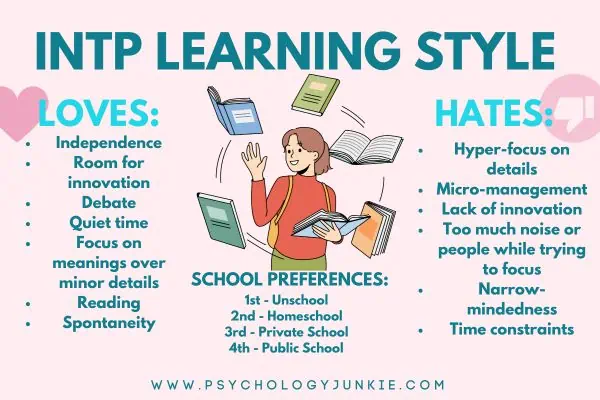
INTPs have a very critical, analytical, and conceptual learning style. They prefer independent study more than many other types and are usually skilled self-directed learners. When they participate in a course, they ask themselves what they are learning and why. They are mainly interested in learning subjects that will help them problem solve, develop an expertise, or theorize. Challenging narrow-minded thinking or posing thought-provoking questions is one of their skills. And thanks to their remarkable ability to spot flaws in logic, they may seem nitpicky or even rebellious to some exasperated teachers. If teachers tell them to stop asking questions or just to accept rules based on tradition, INTPs will find themselves rapidly losing respect for them.
INTPs are more concerned with meeting their own standards than they are with meeting an external set of standards. They have high intellectual goals for themselves and if the lessons they are being taught don’t align with what they think is worthwhile they will often spend their time thinking about other more stimulating ideas. Grades and scores mean far less to INTPs (and ISTPs) than they do to students of other types.
INTPs typically don’t see a lot of point in group or team activities. They like to quietly analyze a problem without being distracted by other people. Working alone is when their mind comes alive, and they learn by default just because their mind is constantly asking “Why?” or “How?” They like abstract learning and exploring theories and original ideas. It’s easy for them to branch out and find connecting ideas or theories alongside the subjects they’re learning about. They’re the types of learners who will have a dozen or more tabs open on their computer and will have learned about five other subjects besides the main subject just because they found a connection. Highly structured, formal learning environments can feel stifling to INTPs, especially if they have to do a lot of rote memorization or repetition.
According to the MBTI® Manual, INTPs prefer the academic subjects of art and science. They also measure three highest on two of three measures of creativity. Their intelligence also shows up in their IQ scores, where they are one of the two types who consistently get the highest scores.
School Preferences:
In a survey I conducted about type and education preferences, INTPs chose unschooling as their preferred learning environment. Homeschooling came in second place, private school came in third, and public school came in last.
Related: The Childhood Struggles of INTPs
The INFP Learning Style

INFPs have a very imaginative, conceptual, and creative learning style. They are drawn to independent learning or one-on-one coaching environments. Having space, time, and quiet to think and process information is key. Being called upon in class and expected to “think out loud” can put them in a state of charged stress. They dislike being put on the spot and they also tend to feel stifled in highly structured environments. According to the MBTI® Manual, they are one of three personality types who consistently get the highest IQ scores (along with INTJs and INTPs).
INFPs may at times enjoy collaborative learning as long as they’ve had time to get to know the other students and aren’t pushed into the process too early. They will feel frustrated if they are put on the spot or not given enough time to analyze the information internally before being pushed to “perform” or answer questions. When it comes to the subject matter being taught, INFPs are always looking for the personal implications of the material. They want to have a personal connection to the lesson and to know how the information will benefit them or other people. Fond of exploring and imagining, they are highly creative when allowed to work at their own pace. They tend to excel in foreign language learning, art, English, and music.
School Preferences:
In a survey I conducted about type and education preferences, INFPs chose homeschooling as their preferred learning environment. Private school came in second place, public school came in third place, and unschooling came in last place.
Related: The Childhood Struggles of INFPs
The ENTP Learning Style
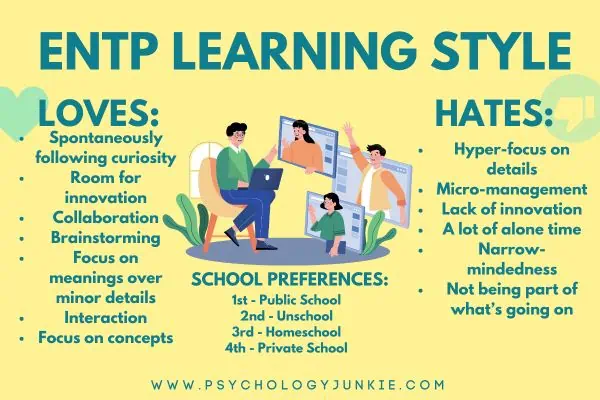
ENTPs have an innovative, conceptual, and abstract learning style. They look for connections and relationships between concepts and they prefer an open-ended, exploratory environment where they can be free to ask questions. Highly structured environments annoy them, especially if they have to do a lot of repetition and memorization or abide by bureaucratic rules. They learn better if they are given an overarching theme or model that they can fill in with related facts and details on their own. Activities that let them strategize, question, make inferences, and form hypotheses attract them. They can seem argumentative in the classroom because they will often point out inconsistencies, loopholes, logical fallacies, or other points of view, especially if their teacher has a very “black and white” mode of teaching.
Settings with flexible rules, structures, and timelines tend to enhance the learning experience for ENTPs. They enjoy collaborating with other students and swapping ideas, thinking out loud, and coming up with creative projects and solutions. Enthusiastic and outgoing, they enjoy asking thought-provoking questions, brainstorming creative ideas, and opening up possibilities that others would never dream of. They excel with teachers who expose them to a broad range of ideas and perspectives.
ENTPs are highly logical individuals and can handle constructive criticism well. They like to look at problems objectively and are usually skilled at quick problem solving. One area where they do sometimes struggle is with remembering details and facts. Theories and concepts stick with them much better, whereas a lot of minutiae can fade into the background and be harder to draw forward when called upon.
According to the MBTI® Manual, ENTPs are among the three highest on two out of three measures of creativity. They also prefer the academic subjects of art and science.
School Preferences:
In a survey I conducted about type and education preferences, ENTPs chose public school as their preferred learning environment. Unschooling came in second place, followed by homeschooling and then private school.
Related: 10 Things That Terrify ENTPs
The ENFP Learning Style
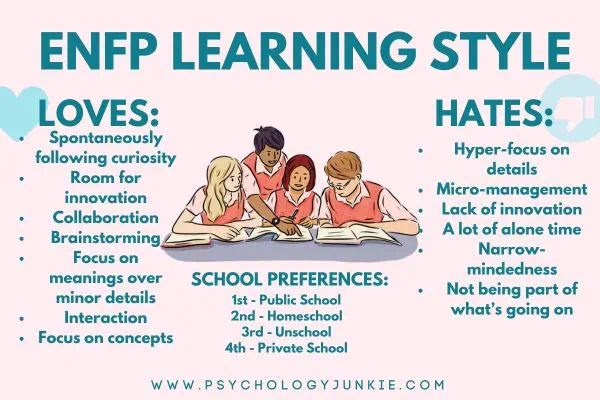
ENFPs have a highly conceptual, imaginative, and abstract learning style. They work well in a collaborative, open-ended environment where they are free to ask questions, bring up related ideas, and brainstorm with their teacher and fellow students. Highly structured learning environments tend to frustrate them, especially if they have to spend a lot of time on repetition, memorizing facts, and doing things “by the book.” They perform better when they are given overarching themes and models that they can fill in on their own with related facts and details. ENFPs are especially motivated when they can apply theories and concepts to matters of personal growth and service to others.
ENFPs will be most comfortable with a teacher who takes the time to get to know them and gives plenty of personal feedback. They like to hear many diverse perspectives and viewpoints and they enjoy extrapolating on the subject matter with numerous related ideas and possibilities. At times, they may seem argumentative, but this is rarely their goal. Instead, they are typically trying to bring up perspectives that perhaps the curriculum or teacher haven’t considered. Teachers who have a very “black and white” method of teaching or who do things very much by the book can be frustrating for ENFPs, especially young ENFPs.
ENFPs tend to dislike a lot of critical feedback. It’s important that teachers assure them of their abilities before they give criticism. A classroom where they are receiving more criticism than encouragement will be very frustrating for them.
According to the MBTI® Manual, ENFPs are highly represented among third- to sixth-grade academically talented students. They rank higher on deductive reasoning than feeling types, with other dominant intuitive types, and they prefer the academic subjects of art, English, and music.
School Preferences:
In a survey I conducted about type and education preferences, ENFPs chose public school as their preferred learning environment. Homeschooling came in second place, followed by unschooling, and then private school.
Related: 5 Ways to Annoy an ENFP
What Are Your Thoughts?
Do you relate to the learning style for your type? Let us know in the comments!
Find out more about your personality type in our eBook, Discovering You: Unlocking the Power of Personality Type.

Sources:
Introduction to Type and Learning by Donna Dunning
The MBTI® Manual – A Guide to the Development and Use of the Myers-Briggs Type Indicator® Instrument – Third Edition by Isabel Briggs Myers, Mary H. McCaulley, Naomi L. Quenk, and Allen L. Hammer
Building Blocks of Personality Type by Leona Haas and Mark Hunziker
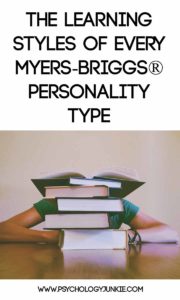









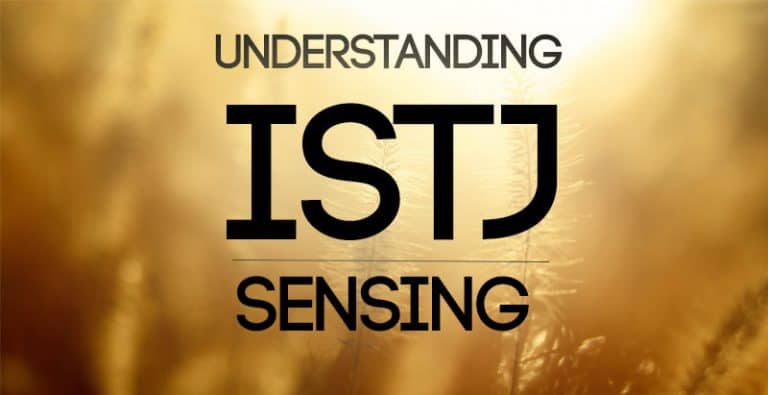
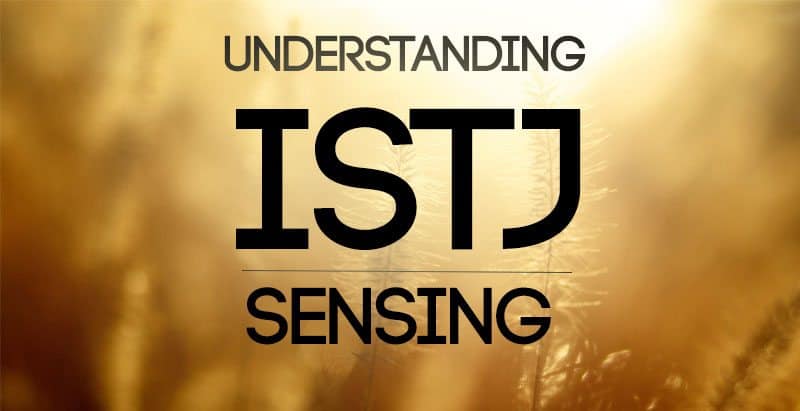


I absolutely relate to this 100% as an ENFP. I’m an abstract, conceptual learner that needs to understand the underlying theory, and overarching narrative theme, of whatever is being discussed in order for me to understand the subject and to make connections between the various concepts. That’s why mind maps and flow charts really helped me out when studying, because I could actually see the connections being drawn between disparate concepts. I also hated classes that involved a lot of fact memorization or retention, and I disliked teachers who did not allow for open discussion and debate in class. I wonder why it is that ENFP’s are highly represented among third-sixth grade academically talented students. I was definitely academically talented throughout elementary school and middle school. I wonder if that academic talent holds true throughout their schooling life. I’m also curious to see where ENFP’s rank among highly intellectual people. I know we aren’t ranked as highly as INTP, INFP, and INTJ, but I would imagine we are up there.
I know that kinesthetic and theoretical leaning were the two main learning styles mentioned in this post, but I was wondering: is there any correlation between personality type and other types of learning styles, such as being an auditory learner, visual learner, etc.?
Infj here and hmmm in school I struggle alot becasue I had alot of emotions and I didn’t know how to deal with it and I felt weak if I asked for help. I didn’t want to bother teachers or really anyone. I loved projects and I will always get excited and really learn everything in depth. I would come home and teach my brothers about it. Homeschooling is better for me as my mind is not distracted and I am not focusing on other emotions or daydream about a person’s life. Although, i do need to share my knowledge i just sometimes record myself or talk out loud and use a big white board to explain things. I am starting to realize that I am open minded and that I do love learning anything but when I put other people’s life, problems, etc. I get distracted, depress and lost. Still learning how to listen to myself and take care of myself. It’s really hard and annoying for me lol but I’ll get there soon.
It can be hard as an INFJ to focus when there are a lot of emotions or people around you. Homeschooling can be a great option for this type!! Wishing you all the best from one INFJ to another!
Susan, I’m wondering if you’ve done any research on how to keep the different types of individuals consistently seeking more learning – learning continuously. I love this article that is based on learning modality – just trying to find some ‘keys’ to keeping people coming back to learning once they’re out of school and in the workplace.
I’ve researched this, but haven’t compiled everything yet or really synthesized it in my brain. Have you ever looked into Jane Kise’s work? You should look her up on YouTube – she works in education using Myers-Briggs to help kids love learning. I think she has a TED Talk 🙂
Thanks a Ton …..Susan I was searching for a name in TED talks on similar context …Thanks for the name Jane. Kise……Your entire article and the flow of it is excellent for a new reader like me on MBTI topic….very useful 👍
Hi Jyoti! I’m so glad this was helpful and I LOVE Jane Kise. Her talks are so insightful and helpful. Thank you for taking the time to comment!
I never heard of different learning types until now and am intrigued. My personality type is INFJ and INTJ.
This was exactly what I was looking for school days and MBTI types…. Enfj in school days and now an ENTJ in corporate set up…..Indian schools need to quickly adapt such approach and implement it in schools for best child engagement and development…..
Thank you Merissa.
I am an online TEFL/ESL teacher (and an INFP), I try to get my students types so that I can understand them and work with them better. This takes it a step further and I’ve bookmarked this post so that I can come back to it. Thank you for an excellent, informative post!
Yes INTJ could be found as top performers. However not the most clever in comparison with the INTP. -TJs gives stability over getting the best marks or achieving outcome.
I wrote on my science blog that this has its drawbacks because they it might make them intelligent in terms of educational by the book intelligence, but they may spend it on the wrong field, relationships or careers in comparison with -TP that leaving their options open is their type of sense of “stability”. -TP are still smart but they spend their intelligence on a wider spectrum of options, or you may call them clever.
TJ- intelligence by the book (book smarts)
TP- cleverness (street smarts)
I am an EFNP. And the description was dead on. This was very interesting I’m glad I checked it out.
My ESFP I an hand on student. I understand well when i get my self involved in learning
I attended private school for kindergarten, then public school grades 1-12, then private university as an adult. The private kindergarten was more orderly and had high standards, which was good for keeping students well behaving. The public school arranged desks in groups which made kids (including me) more likely to talk to peers and not pay attention to the teacher. I chose the private university because of the majors it offered, but I didn’t like that small class sizes meant that we had to do annoying ice breakers and/or introductions in almost every class. I would’ve liked to be homeschooled as a kid because of the bullying I got there, but my parents would’ve never allowed it. I felt like a lot of school material was useless/a waste of time, and I wanted more time to pursue writing novels, which I had to do in my free time instead.
I’m currently homeschooling my own ISTP child because of all the flaws I see with public/private school (how it’s basically teaching kids to conform to their peers and hate learning academic stuff). She definitely hates lectures and ambiguity, and likes the freedom to do work when she feels like it. She actually does like thinking out loud, which irritates me. She likes hands on activities too. A trade school job would probably suit her.
As an INFP, the emphasis on individual learning styles and the ability to connect concepts deeply resonates with me. Homeschooling seems like the best fit, allowing for independent exploration.